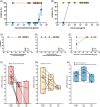Clinical efficacy and in vitro neutralization capacity of monoclonal antibodies for severe acute respiratory syndrome coronavirus 2 delta and omicron variants
- PMID: 35662058
- PMCID: PMC9347884
- DOI: 10.1002/jmv.27916
Clinical efficacy and in vitro neutralization capacity of monoclonal antibodies for severe acute respiratory syndrome coronavirus 2 delta and omicron variants
Abstract
We aimed to provide in vitro data on the neutralization capacity of different monoclonal antibody (mAb) preparations against the severe acute respiratory syndrome coronavirus 2 (SARS-CoV-2) delta and omicron variant, respectively, and describe the in vivo RNA kinetics of coronavirus disease 2019 (COVID-19) patients treated with the respective mAbs. Virus neutralization assays were performed to assess the neutralizing effect of the mAb formulations casirivimab/imdevimab and sotrovimab on the SARS-CoV-2 delta and omicron variant. Additionally, respiratory tract SARS-CoV-2 RNA kinetics are provided for 25 COVID-19 patients infected with either delta variant (n = 18) or omicron variant (n = 7) treated with the respective mAb formulations during their hospital stay. In the virus neutralization assay, sotrovimab exhibits neutralizing capacity at therapeutically achievable concentrations against the SARS-CoV-2 delta and omicron variant. In contrast, casivirimab/imdevimab had neutralizing capacity against the delta variant but failed neutralization against the omicron variant except for a very high concentration above the currently recommended therapeutic dosage. In patients with delta variant infections treated with casivirimab/imdevimab, we observed a rapid decrease of respiratory viral RNA at day 3 after mAb therapy. In contrast, no such prompt decline was observed in patients with delta variant or omicron variant infections receiving sotrovimab.
Keywords: COVID-19; SARS-CoV-2; casirivimab/imdevimab; delta variant; monoclonal antibodies; omicron variant; sotromivab; virus neutralization assay.
© 2022 The Authors. Journal of Medical Virology published by Wiley Periodicals LLC.
Conflict of interest statement
The authors declare no conflict of interest.
Figures

Similar articles
-
Susceptibility of SARS-CoV-2 Omicron Variants to Therapeutic Monoclonal Antibodies: Systematic Review and Meta-analysis.Microbiol Spectr. 2022 Aug 31;10(4):e0092622. doi: 10.1128/spectrum.00926-22. Epub 2022 Jun 14. Microbiol Spectr. 2022. PMID: 35700134 Free PMC article.
-
Serum neutralization of SARS-CoV-2 Omicron sublineages BA.1 and BA.2 in patients receiving monoclonal antibodies.Nat Med. 2022 Jun;28(6):1297-1302. doi: 10.1038/s41591-022-01792-5. Epub 2022 Mar 23. Nat Med. 2022. PMID: 35322239
-
Ronapreve (REGN-CoV; casirivimab and imdevimab) reduces the viral burden and alters the pulmonary response to the SARS-CoV-2 Delta variant (B.1.617.2) in K18-hACE2 mice using an experimental design reflective of a treatment use case.Microbiol Spectr. 2024 Aug 6;12(8):e0391623. doi: 10.1128/spectrum.03916-23. Epub 2024 Jul 16. Microbiol Spectr. 2024. PMID: 39012120 Free PMC article.
-
[Sotrovimab in controlling SARS-CoV-2 infection].Pol Merkur Lekarski. 2022 Feb 22;50(295):48-50. Pol Merkur Lekarski. 2022. PMID: 35278299 Review. Polish.
-
Immune treatment in COVID-19.Rev Esp Quimioter. 2022 Apr;35 Suppl 1(Suppl 1):59-63. doi: 10.37201/req/s01.14.2022. Epub 2022 Apr 22. Rev Esp Quimioter. 2022. PMID: 35488829 Free PMC article. Review.
Cited by
-
Sotrovimab in Hospitalized Patients with SARS-CoV-2 Omicron Variant Infection: a Propensity Score-Matched Retrospective Cohort Study.Microbiol Spectr. 2023 Feb 14;11(1):e0410322. doi: 10.1128/spectrum.04103-22. Epub 2022 Dec 8. Microbiol Spectr. 2023. PMID: 36475890 Free PMC article.
-
The clinical effectiveness of REGEN-COV in SARS-CoV-2 infection with Omicron versus Delta variants.PLoS One. 2022 Dec 2;17(12):e0278770. doi: 10.1371/journal.pone.0278770. eCollection 2022. PLoS One. 2022. PMID: 36459537 Free PMC article.
-
Multiplex Microscopy Assay for Assessment of Therapeutic and Serum Antibodies against Emerging Pathogens.Viruses. 2024 Sep 17;16(9):1473. doi: 10.3390/v16091473. Viruses. 2024. PMID: 39339949 Free PMC article.
References
MeSH terms
Substances
Supplementary concepts
LinkOut - more resources
Full Text Sources
Miscellaneous

